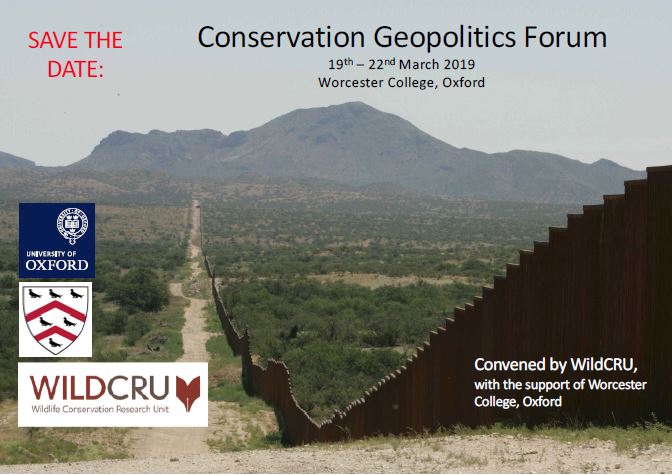News
Date Announced for Conservation Geopolitics Forum 2018
The WildCRU Forum on Conservation Geopolitics:
developing conversations across disciplines
Save the Date
19th – 22nd March 2019
Worcester College, Oxford
Wildlife is threatened by challenges that are global in scale. These challenges are influenced
by geopolitical relationships between countries, and their multiple, sometimes conflicting
but often overlapping interests. Understanding and addressing the role of geopolitics in
wildlife conservation requires diverse forms of expertise.
The objective of this ground-breaking conference is to spark a scholarly and practicallyminded
conversation around Conservation Geopolitics – how it shapes global trends that
threaten wildlife, and how it might work as a site of intervention for conservation futures.
We aim to assemble leading figures from multiple disciplines, alongside conservation
practitioners and policymakers, early career researchers and civil society groups. Through an
innovative mix of plenary sessions, specialist paper sessions, workshops, agenda-setting
processes and forum sessions, we will develop a conversation that transcends disciplinary
boundaries, unsettling taken-for-granted assumptions and promoting the emergence of
new insights.
We invite papers and posters on the theme of Conservation Geopolitics from fields including
(but not limited to) conservation science, international relations, law, development studies,
environmental economics, tourism studies, political science, political ecology, human
geography, anthropology, environmental humanities, and conservation ethics. We
encourage both applied and critical interventions. We aim to facilitate a broad conversation.
Day 1 (Wednesday 20th March 2019) starts by setting the scene, with a series of plenary
presentations focussing on the challenges posed to wildlife by trends in global agriculture,
human demographics and migration, economic development within and between countries,
national and international governance, as well as the influence of human conflicts, changing
climates, and political borders on wildlife. We will then hear from a series of invited
speakers, from across the academy, reflect on how their disciplines understand the role of
geopolitics in both shaping and addressing these global challenges.
Day 2 (Thursday 21st March 2019) includes papers from across the disciplines, both applied
and critical, in multiple conference streams that will address five main arenas of
intervention in the geopolitics of conservation:
– Political (including international relations, governance, law)
– Economic and social (including novel regimes, eco-tourism, marketing)
– Planning (including land use modelling, and spatial planning)
– Technological (including practical technologies and implications for governance)
– Ethical (including reflections on the ethics of state and individual behaviours)
After lunch, each of these streams will evolve into a workshop session, aiming to identify
the key contributions in each area for the broader forum
Day 3 (Friday 22nd March 2019) begins with an innovative synthesis event to foster transdisciplinary conversations about Conservation Geopolitics. The conference will conclude
with a final set of plenary speakers (including practitioners and policymakers) addressing the
challenges of transdisciplinary approaches to conservation in a geopolitical world.
The conference will be book-ended by additional events on the Tuesday (19th) and
Saturday (23rd). On the Tuesday evening the conference will be opened with a public lecture
and drinks reception, from 6pm. On the Saturday, we will be running a series of local fieldtrips,
short courses in methods for early career researchers, and writing groups that followon
from the conference. On the Wednesday evening, there will be an optional conference
dinner. A limited number of travel bursaries will be available for practitioners and/or
students attending from overseas.
More information, including opening of the Call for Papers, registration details, and the
plenary speakers will be released on the conference website: https://cgforum.web.ox.ac.uk
during the Summer of 2019. This Conference is supported by the Kadas Fellowship at
Worcester College, Oxford and the Wildlife Conservation Unit of the University of Oxford.






